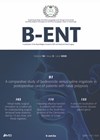
Journal Reviews
Role of intratympanic corticosteroid for treatment of Bell’s palsy and Ramsay Hunt syndrome
Acute peripheral facial palsy occurs annually in 30 in 1,000,000 individuals in the general population. Bell’s palsy and Ramsay Hunt syndrome account for about 70% of cases of peripheral facial palsy. They are believed to be caused by viral reactivation...
Septoplasty under local and general anaesthetic
This Turkish prospective, non-randomised study compared the quality of life outcomes in 50 patients who underwent local anaesthetic (LA) septoplasty, and 50 patients who underwent general anaesthetic (GA) septoplasty over a six-month period. Quality of life outcomes were measured using...
Treatment options for vestibular neuritis: systematic review and meta-analysis
Vestibular neuritis (VN) is the third most common cause of peripheral vertigo. VN has been postulated to have viral aetiology and historically it was treated with steroids, until 2011 when a Cochrane review demonstrated lack of robust evidence behind this...
Predicting the nature of swallowing deficits caused by surgical resection of the tongue?
Patients treated surgically for cancer of the tongue are expected to have difficulty in eating, drinking and swallowing. The authors of this paper report on a cohort of 106 patients in their practice who had surgical resection as primary treatment....
Loudness in non-organic hearing loss
Non-organic hearing loss has been of interest to researchers for a long time. In this study the authors compared a loudness rating measured in relation to the sound level for 1000 Hz in normal hearing patients and patients diagnosed with...
Speech predictors after glossectomy
This is a cross-sectional study from India where 69 patients were assessed for speech intelligibility and phonetics using an assessment tool in the local language. Volume defects were classified into thirds and the location of this defect noted. Not unsurprisingly,...
Cochlear implantation in asymmetric hearing loss
Criteria for cochlear implantation (CI) is a constant topic of debate. The UK traditionally had relatively restrictive guidance, although this has been greatly improved by more recent guidance released in 2019. Nevertheless, because of the lack of evidence for cost-effectiveness,...
Don’t be too apologetic: disclosing communication difficulties
People who stutter are frequently considered less intelligent or less confident, and are often discriminated against. These negative perceptions have been found to differ slightly across different cultural groups. For Hebrew speakers in Israel, having a stutter can have a...
Transmastoid facial nerve decompression for persistent traumatic facial nerve paralysis
Facial nerve paralysis (FNP) can occur following trauma, with a small number of these patients requiring facial nerve decompression (FND) to aid recovery. The authors shared their experience in decompressing the facial nerve for persistent severe FNP via a transmastoid...
How patients reacted to postponement of cochlear implant surgery due to COVID-19
The onset of COVID-19 in 2020 required widespread cancellation of elective surgeries, one of these being cochlear implant for profoundly deafened adults and post-lingually deafened children. Through a questionnaire, to which 23 out of 38 patients responded, this qualitative study...
Implications of tonsillectomy in very young children
This is a comprehensive study comprising 157 children who underwent tonsillectomy below the age of two years, mainly for sleep-disordered breathing (86.6%) and recurrent tonsillitis (7%). With relatively recent understanding of OSAS, the indications for tonsillectomy in children under two...
Persistent imbalance after traumatic brain injury is central in origin
Several residual symptoms, including dizziness and imbalance, can follow traumatic brain injury, no matter how mild. This study focused on the mechanisms, peripheral and central, underlying the complaint of persistent imbalance in patients with chronic mild traumatic brain injury (mTBI)....
















